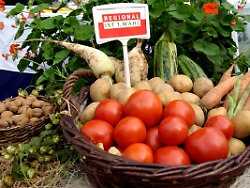“Less than 500 kilometers from the market”
Clear rules for “regional products” demanded
03/28/2022 11:04 am
For many foods, there have long been requirements to identify the origin of the product. However, the label “regional” is not protected – and therefore invites free interpretation. The Federal Association of Consumer Centers is committed to binding regulations.
Consumer advocates are pushing for clear rules for designating the origin of food from the region. “If carrots are advertised as a regional product, they should not be grown 500 kilometers from the supermarket,” said Christiane Seidel, food expert at the Federal Association of Consumer Centers (VZBV), the newspapers of the Funke media group.
To date, terms such as “region” or “regional” have neither been clearly defined by law nor have they been subject to specific, uniform requirements, criticize consumer advocates. They are therefore calling on the European Commission to establish uniform minimum standards for regional identification. The future labeling of the origin and regionality of food must be easy to understand, uniform, comparable and binding, it said. “Anyone who buys ‘eggs from our farmers’ in Brandenburg should not have eggs from the Netherlands in their basket,” said Seidel.
indication of the country of origin
The consumer advocate suggests labeling the country of origin of a product – such as Germany or France – on all foods. The country of origin is already mandatory for many foods. This includes fresh fruit and vegetables, eggs and fresh beef.
Federal Minister of Agriculture Cem Özdemir is campaigning at EU level for an expansion of the mandatory labeling of origin. He and his Austrian counterpart Elisabeth Köstinger also launched an initiative with which the EU Commission is asked, among other things, to quickly submit a proposal for a more comprehensive labeling of origin.
It is part of the EU Commission’s strategy for more sustainable agriculture (“Farm to Fork”/”From Farm to Plate”), as explained. According to this, an extension of the mandatory indication of origin to products such as milk and milk as an ingredient, meat as an ingredient, rice or tomatoes in certain tomato products is to be examined.
